Propolis
bees, honey and other sticky subjects
Sunday, April 30, 2006
Bee boles -- cavities for skeps in walls -- are found throughout Britain and are now recorded on the web by IBRA.
Saturday, April 29, 2006
Lots at the Meon Valley Bee Auction 2006
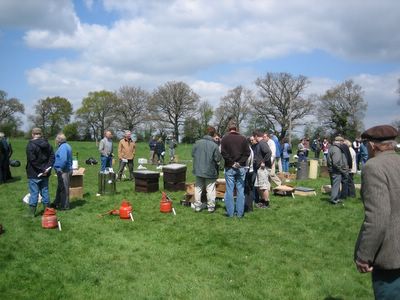
The Annual Bee Auction run by Meon Valley Beekeeping Association in Hampshire was held today. It's been running now for almost three decades and draws beekeepers from Hampshire and well beyond. I'm told it started informally to get rid of the chattels of a deceased beekeeper. And then they just kept dying! No significant deaths this year, but about 250 lots to bid for.


A bevy of helpers for the auctioneer produce a slick event.


Ready?

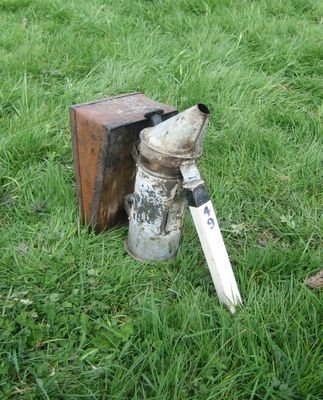
Old smokers never die ... Lot 49.


A trio of nucs. From left to right, they fetched £110, £85 and £95 (about $190, $150 and $175 respectively) to the stifled gasps of old hands watching. But it has been a tough winter with many people reporting high losses.

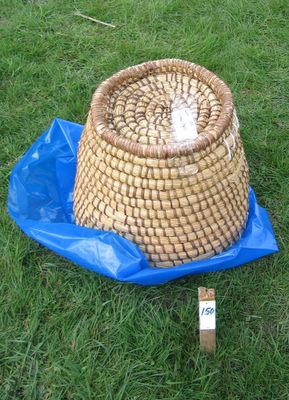
Fancy skep ... Lot 150. Would you wear it or catch swarms with it?


Beekeeper's innovation.

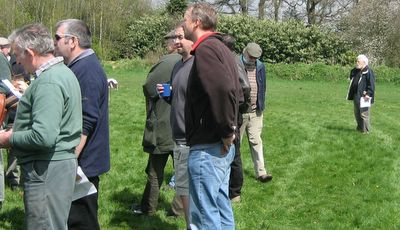
Is that man with the mobile phone taking proxy bids?

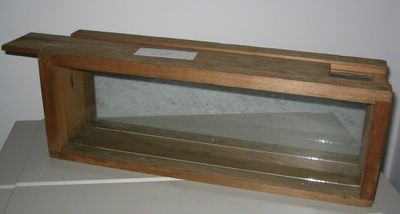
Lot 166 A display case for a Langstroth shallow frame. Price? £4 ($7). My single successful bid, but quite a snip!

Labels: my pictures
Thursday, April 27, 2006
Visionary
Over 8,500 hexagonal lenses packed into an area the size of a pinhead -- an artificial insect eye, similar to a bee eye, made by Californian researchers.
Wednesday, April 26, 2006
Honeybee Cancer Institute emblem
The emblem of the US National Cancer Institute's Tenth Annual Spring Research Festival is the honeybee. (They've got an odd picture of a bee, though.)
Tuesday, April 25, 2006
Surprise package

I've been trying for years to have one. I tried everything. But nothing worked. Then today I was making a cup of coffee, staring vacantly into the garden and saw it arrive -- in the compost bin. A queen bumblebee has set up home.
So, I've had to decommission the bin. I've yet to see her close enough to identify her, but I opened the bin tonight and was met by a buzzing complaint, so I think she's established her territory.

Monday, April 24, 2006
Vote, vote, vote
After the arguments raged, you can now vote online on the new Utah quarter symbol -- a snow boarder, a beehive, or a golden spike.
Bee voting patterns
The way that a swarm decides on a new nesting site has been revealed by Thomas Seeley in latest issue of The American Scientist (actually, I think he did it a few years ago in his marvellous book, The Wisdom of the Hive, but maybe he's added a few experiments and mathematical models since).
anyway, he describes how, by means of waggle-dancing, bees communicate their site preferences and how a threshold view is reached. Bees are also smart enough to trade
off between finding an ideal home and finding one quickly (they've got one up on some would-be purchasers of my last house then!)
anyway, he describes how, by means of waggle-dancing, bees communicate their site preferences and how a threshold view is reached. Bees are also smart enough to trade
off between finding an ideal home and finding one quickly (they've got one up on some would-be purchasers of my last house then!)
For a group of about 10,000 bees, several hundred scout out nest sites, but it takes the build-up of just 10 to 20 bees at a site before the swarm starts to move to that location.I well remember watching, a few years go, a swarm arguing about moving into my swarm box and setting up home in the eaves of a nearby house. Some scouts were dancing in favour of a great des res in the eaves, but my empty beer box on the ground won because the queen had damaged a wing and couldn't fly.
Bees alleged to have forced down plane in Kazakhstan
Quite possibly be the best bee story of the year:
A flight from Sydney to London was forced to land in Kazakhstan following an alarm supposedly triggered by bees onboard. The British Airways Boeing 747 flight couldn't take off again immediately because it was too heavy for the runway in Uralsk, a city of 210,000 people in north-western Kazakhstan.
The airport had no exit stairs that could reach the doors of the jet, so passengers had to disembark by clambering on to a tall airport vehicle. They were then taken to their destination in three separate planes. The jet left 20 hours later.
Although bees were blamed for triggering the alarm, a spokesperson said that they were found still in their original packaging. (Did they count them?)
Kaliula Karagoishin, a spokesman for the regional governor, Nurgali Asimov, said "We don't get such big birds landing every day".
A flight from Sydney to London was forced to land in Kazakhstan following an alarm supposedly triggered by bees onboard. The British Airways Boeing 747 flight couldn't take off again immediately because it was too heavy for the runway in Uralsk, a city of 210,000 people in north-western Kazakhstan.
The airport had no exit stairs that could reach the doors of the jet, so passengers had to disembark by clambering on to a tall airport vehicle. They were then taken to their destination in three separate planes. The jet left 20 hours later.
Although bees were blamed for triggering the alarm, a spokesperson said that they were found still in their original packaging. (Did they count them?)
Kaliula Karagoishin, a spokesman for the regional governor, Nurgali Asimov, said "We don't get such big birds landing every day".
Saturday, April 22, 2006
Suggestions?
I had an email today from a googler:
You lucky man ;-) The bees may well be mason bees, perhaps even red mason bees which are very good early season pollinators.
Probably the best time to repoint is in the autumn/winter, but of course that will seal in next year's eggs and you probably won't have the bees around for a few years unless there is another favoured location next year. If you really want to try to save some bees, you could try installing a few red mason bee nests now from the Oxford Bee Company (website currently unavailable), but info here: http://www.btinternet.com/~bury_rd/mason.htm
Although they likeweathered nests, they might just occupy a few "straws" this year. They will be laying next year's eggs very soon now.
good luck
Turlough
Sorry to bother you but your blog came up on a google search and II suggested the following, but does ayone have other ideas:
wondered whether you could help me.
I have an infestation of bees in the mortar of my flat in the UK, I
thought they were bumble bees but having searched the web I realise
they are probably mason bees.
The mortar is old and I will have to have it re-pointed but I don't
want to disturb or harm them more than I have to as I actually like
bees, especially the big bumble bees that we occasionally get in our
houses.
So my question is "when would be the best time to re-point?" I
really don't want to get rid of them and will construct a habitat for
them.
Thank you for your indulgence
Regards
You lucky man ;-) The bees may well be mason bees, perhaps even red mason bees which are very good early season pollinators.
Probably the best time to repoint is in the autumn/winter, but of course that will seal in next year's eggs and you probably won't have the bees around for a few years unless there is another favoured location next year. If you really want to try to save some bees, you could try installing a few red mason bee nests now from the Oxford Bee Company (website currently unavailable), but info here: http://www.btinternet.com/~bury_rd/mason.htm
Although they likeweathered nests, they might just occupy a few "straws" this year. They will be laying next year's eggs very soon now.
good luck
Turlough
Tuesday, April 18, 2006
Bookish? Me? Of course!
How did I miss that book reading:
Although she was not nude and slathered in honey, as she has appeared in past performances, Karen Finley's reading of her book 'George and Martha' at Labyrinth Books last night was still controversial ...Information, please!
Manuka trademark?
There's a hullabaloo brewing down under. Comvita is trying to trademark the name manuka in European markets. They say it's just to protect themselves, but other Kiwi beekeepers think they could be bounced out of using the name in exports. It seems that anyone can use the name in New Zealand home markets where it cannot be registered as a trademark. This should be an interesting story to follow. (Manuka is the therapeutic honey that comes from the tea tree.)
Royal Jelly
A Slovenia beekeeper (and reader) has asked me to publicise their royal jelly site. Mitja admits the subject is controversial. I agree!
Thursday, April 13, 2006
Dangling legs aid flight
Orchid bees could be giving some ideas to developers of small search-and-rescue aircraft. The bees fly with their legs dangling down. That doesn't slow them down, but instead gives them increased lift and perhaps stability -- like aircraft wings. Designers might use the idea to control pitch and roll.
Pollinating the economy
Here's another angle on the significance of honey pollination to modern economies featuring almonds and cranberries along with walnuts and pistachios (which I don't think are honeybee-pollinated).
Bad job in the Punjab
One of India's biggest honey-producing areas, The Punjab, is reported to be experiencing a decline in honey production of 25% because of an increase in varroa (blamed on introduced colonies) and decreasing honey prices (causing beekeepers to give up).
Labels: honeybee health, varroa
Globalism and beekeeping
The recent protests about the proposals to allow honey imports to New Zealand are put into sharp focus by the experience of one beekeeper in “neighbouring” Australia:
Norm Pope is selling honey today at A$1.60 and A$2.05 per kilogram instead of the A$4.50 to A$5 per kilogram two and a half years ago. Norm blames the big supermarkets and cheap Chinese imports.
Norm Pope is selling honey today at A$1.60 and A$2.05 per kilogram instead of the A$4.50 to A$5 per kilogram two and a half years ago. Norm blames the big supermarkets and cheap Chinese imports.
Thursday, April 06, 2006
Level playing field looms down under
Despite the recent beekeeper protests, Biosecurity Minister Jim Anderton appears to have dismissed out of hand arguments that importation of bee products would destroy the Kiwi beekeeping industry:
The bee keepers had said that honey imports -- expected to price at retail for half the cost of New Zealand honey -- could make beekeeping untenable.
That, in turn, would cripple horticulture, which is hugely reliant on farmed bees for pollination.
To date, the import of bee products has been restricted due to concerns about a disease -- european foulbrood -- that posed a risk to healthy hives.
... Mr Anderton said New Zealand "cannot ignore or have double standards over our international trade obligations alongside our domestic obligations. We must continue to support a rules and evidence-based approach to international trade."
After recognising that the industry had suffered setbacks associated with the import-introduced varroa mite in recent years, he said honey must be dealt with on the same level playing field as other primary industry export.
... "New Zealand is a major primary producer, hugely reliant, more than any other developed nation, on the export of our primary produce. Over a third of New Zealand's total honey production, for example, goes overseas. This amounted to $36 million in 2005."
But any act of protectionism would lead to WTO challenges, he said.
... "The fact is New Zealand is a small trading nation and we have to follow the rules." said Mr Anderton.
Labels: honeybee health, varroa
Tuesday, April 04, 2006
Smoke screen

To make sure you don't miss this great picture of the protest at New Zealand's parliament, The Beehive, I've lifted it from Craig Simcox of the Dominion Post. I think/hope the poor visibility is caused by beekeepers' smokers rather than the authorities' tear gas. For more about the protest see earlier post.
Arguing for the lifting of the honey import ban,Jim Anderton New Zealand government minister claimed:
At the present time, New Zealand exports about $30 million worth of honey. If we were to take the actions that Mr Ardern is suggesting and intervene politically in these matters, it would not be very long before New Zealand, which is the most export-dependent developed country in the world, faced barriers all over the world ... we depend on 95 percent of our agricultural produce for 65 percent of our entire foreign exchange earnings.

Sunday, April 02, 2006
Fatalistic bees
Late as spring is, I sneaked a peek at my bees today even though the weather was windy and cool. Development is certainly delayed -- brood was found on only about five sides of frames in three of the four colonies.
A fifth colony was found to have a drone-laying queen or laying workers. So only four hives out of six made it through winter -- my worst survival rate in ten years of beekeeping.
But that fifth colony was interesting. There were plenty of bees and they weren't consuming many stores -- both factors attributable to the absence of brood (bees are thought to wear themselves out quicker if there is brood to feed). But most interesting was the condition of the hive -- it was quite mouldy -- unlike the other hives. It seems the bees are demoralised and know their fate.
A fifth colony was found to have a drone-laying queen or laying workers. So only four hives out of six made it through winter -- my worst survival rate in ten years of beekeeping.
But that fifth colony was interesting. There were plenty of bees and they weren't consuming many stores -- both factors attributable to the absence of brood (bees are thought to wear themselves out quicker if there is brood to feed). But most interesting was the condition of the hive -- it was quite mouldy -- unlike the other hives. It seems the bees are demoralised and know their fate.
Kiwi beekeepers protest at The Beehive
New Zealand beekeepers plan a protest at The Beehive, the country's government building, against allowing honey imports. It is thought the relaxation on imports may be part of a deal to open up apple imports to Australia.
Saturday, April 01, 2006
Artificial swarm tip
How often have you split a hive to try to create an artificial swarm only to find that you cannot find the queen? There's a good 50% chance of leaving the brood-and-queen-cells split with the old queen -- 100% chance if Murphy has a hand in it.
Bee Craft, the monthly magazine of the British Beekeepers' Association has a great tip this month for such situations:
Move the brood combs to a new brood box leaving all the bees in the original brood box. Then put a queen excluder on top of the old brood box and place the new brood box at the top of the reassembled hive. Then one day later, create a new hive with the new brood box to the side of the old one and carry on with your artificial swarm as normal.
What happens is: the queen (and all the bees) is inevitably left in the old brood box, but when the hive is reassembled the nurse bees make their way to the brood in the new brood box at the top of the hive. The queen can't get through the excluder and so stays in the old brood box.
Nice one! As long as the bees don't attempt to swarm in the 24 hours that the hive remains as one.
Bee Craft, the monthly magazine of the British Beekeepers' Association has a great tip this month for such situations:
Move the brood combs to a new brood box leaving all the bees in the original brood box. Then put a queen excluder on top of the old brood box and place the new brood box at the top of the reassembled hive. Then one day later, create a new hive with the new brood box to the side of the old one and carry on with your artificial swarm as normal.
What happens is: the queen (and all the bees) is inevitably left in the old brood box, but when the hive is reassembled the nurse bees make their way to the brood in the new brood box at the top of the hive. The queen can't get through the excluder and so stays in the old brood box.
Nice one! As long as the bees don't attempt to swarm in the 24 hours that the hive remains as one.
Labels: swarming
Bulgarian honey market
According to Gancho Ganes, the head of the Bulgarian beekeepers' association, Bulgarian beekeepers make 0.2 Euros for a kilo of honey and that 80% of the honey in Bulgarian shops is adulterated with fructose or glucose.
